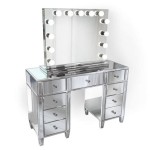Types of Mirrors and Lenses That Diverge Light Rays
Diverging optical elements play a crucial role in manipulating light, finding applications in various fields from corrective eyewear to telescopes. These elements, primarily concave lenses and convex mirrors, spread out incident light rays, creating virtual images and offering unique optical properties.
**Concave Lenses: The Diverging Lens**
A concave lens is thinner at its center than at its edges. This shape causes parallel rays of light passing through the lens to diverge, or spread outwards. The extent of divergence depends on the curvature of the lens surfaces and the refractive index of the lens material. The greater the curvature, the greater the divergence. Similarly, a higher refractive index leads to a greater degree of bending and thus more divergence.
The light rays, after passing through a concave lens, appear to emanate from a single point called the virtual focus (F). The distance between the center of the lens and the virtual focus is the focal length (f). Concave lenses always have a negative focal length, a convention used to distinguish them from converging lenses.
Concave lenses form virtual, upright, and diminished images. A virtual image cannot be projected onto a screen as it is formed by the apparent intersection of diverging rays, not the actual convergence of light. The image is upright, meaning it has the same orientation as the object. It is also diminished, meaning the image is smaller than the object.
Common applications of concave lenses include eyeglasses for correcting nearsightedness (myopia), peepholes, and in some telescope designs to widen the field of view.
**Convex Mirrors: The Diverging Mirror**
A convex mirror, also known as a diverging mirror, has a reflecting surface that bulges outwards. Unlike a concave mirror, which converges light, a convex mirror reflects incident parallel rays outwards. This divergence creates a virtual image behind the mirror.
Similar to concave lenses, the reflected rays appear to originate from a virtual focus (F) located behind the mirror. The distance between the mirror's surface and the virtual focus is the focal length, which is always negative for convex mirrors. The curvature of the mirror directly affects the divergence and consequently the focal length. A more curved mirror has a shorter focal length and causes greater divergence.
Convex mirrors always produce virtual, upright, and diminished images. The virtual nature means the image cannot be projected onto a screen. The upright orientation means the image is not inverted. The diminished size means the image appears smaller than the object, regardless of the object's distance from the mirror.
The most common application of convex mirrors is in security mirrors, often seen in stores and parking garages. The wide field of view provided by the diverging reflection allows a larger area to be monitored. They are also used as passenger-side mirrors in vehicles, providing a wider view of the surrounding traffic but also making objects appear smaller and farther away than they are. This is why these mirrors often carry the warning "Objects in mirror are closer than they appear."
**Key Differences and Similarities between Concave Lenses and Convex Mirrors**
While both concave lenses and convex mirrors diverge light and produce virtual, upright, and diminished images, they achieve this through different mechanisms. Concave lenses refract light as it passes through the lens material, while convex mirrors reflect light from their surface. This difference in interaction with light leads to subtle variations in image formation.
Another key difference lies in the location of the virtual image. In a concave lens, the virtual image is formed on the same side of the lens as the object, while in a convex mirror, the virtual image is formed behind the mirror.
Despite these differences, their shared ability to diverge light makes them valuable tools in various optical systems. They are often used in combination with converging elements to control the focus and magnification of images.
**Factors Influencing Divergence**
The degree of divergence produced by both concave lenses and convex mirrors is influenced by their curvature. A greater curvature leads to a stronger divergence and a shorter focal length. In the case of lenses, the refractive index of the lens material also plays a crucial role. Higher refractive indices result in greater bending of light and thus increased divergence.
Understanding the properties of diverging optical elements is crucial for designing and utilizing optical systems effectively. Their ability to create virtual images and manipulate light rays offers unique functionalities in a wide range of applications, from correcting vision defects to enhancing security and surveillance.
The principles governing the behavior of light interacting with these elements are fundamental to optics and play a vital role in shaping our understanding of light and its applications.

Light And Optics Thin Lenses Physics 299

Difference Between Mirror And Lens With Examples

Optical Lenses Convex Concave Mirror Theory

How Mirrors Lenses And Prisms Shape Light Systems Laser Focus World

Ray Diagrams 3 Of 4 Concave And Convex Lenses Mirrors Parallel Light Rays

Mirrors And Lenses
What Is The Difference Between A Concave Mirror And Convex Lens Quora

Distinguish Between A Converging And Diverging Lens

Image Formation By Lenses Concave And Convex Lens Ray Diagrams Faqs
Why Is A Concave Mirror Called Converging While Convex Lens Quora








